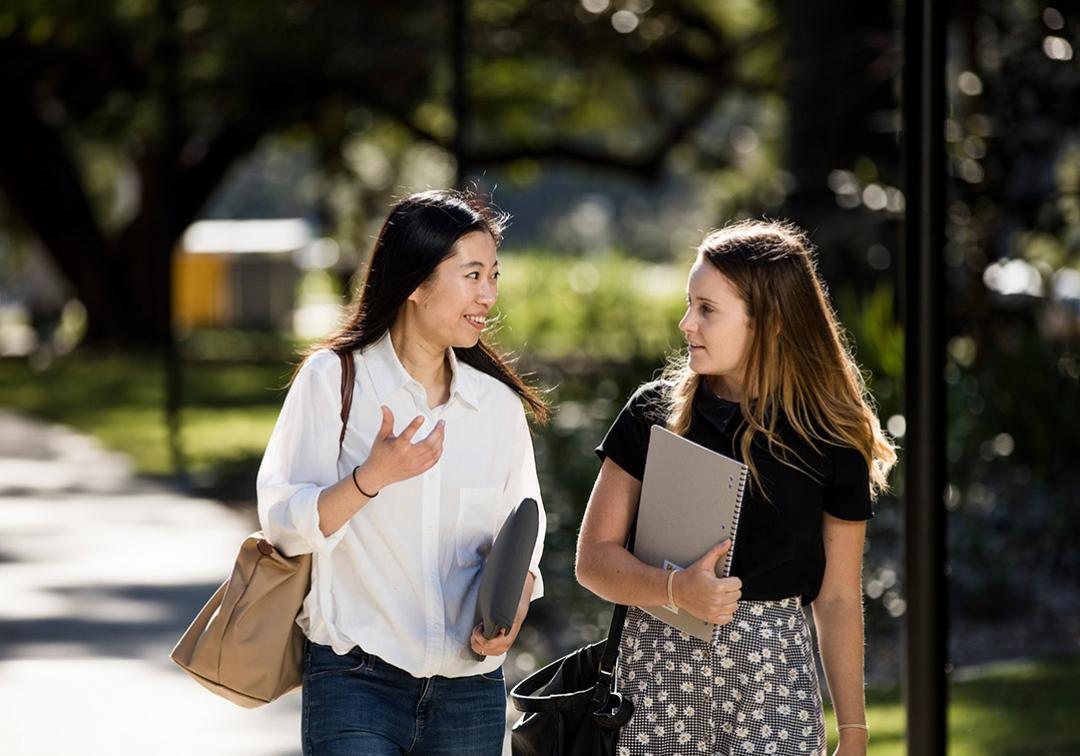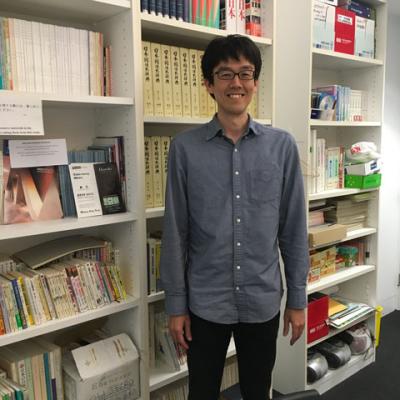
Master of Applied Linguistics
Overview
Applied Linguistics is the study of how languages are used and how they can be analyzed, learned, and best be taught.
Understanding how languages are used is crucial in understanding human behaviour as we grow, live, work and interact with each other, whether in the home, school, work, or across international boundaries, cultures and customs.
Our program in Applied Linguistics is a quality professional development program for Australian and International language professionals in second language teaching, learning and use. Courses are designed around the practical applications of language studies which will improve your understanding of how language works in a wide range of social and professional environments.
Students can complete a range of courses covering the analysis of language in use and have the option to take a selection of elective courses to tailor the program to their individual learning goals. There are 2 fields of study students can choose from: TESOL or Language and Discourse Analysis (new in 2023). In the TESOL field of study students take a number of courses dedicated to issues in teaching English around the world. Those in the Language and Discourse Analysis field of study will take courses covering a range of qualitative and quantitative approaches to language in use.
The Master of Applied Linguistics prepares graduates to be employable across a range of industries including education, translation, editing, publishing, language data analysis and language technologies.
Program highlights
- Study at UQ’s School of Languages and Cultures, an international leader in the teaching of interpreting and translation.
- Work with and learn from more than 50 leading researchers who specialise in a diverse range of disciplines.
- Specialise in Teaching of English to Speakers of Other Languages (TESOL) Studies or Language and Discourse Analysis.
Fields of study
Tailor your studies to suit your goals. This program offers these options:
- Language and Discourse Analysis
- TESOL Studies
How you'll learn
Your learning experiences are designed to best suit the learning outcomes of the courses you choose.
- Lectures
- Tutorials
- Workshops
What you'll study
At UQ, degrees are called 'programs' and subjects are called 'courses'. Here's a sample of the courses you could study in this program:
- Introduction to Second Language Learning and Teaching
- Concepts in Applied Linguistics
- Second Language Acquisition
- Language, Culture and Communication
Career possibilities
Postgraduate study can take you anywhere. Depending on which field you choose, here are some of the careers you could be on your way to:
- Linguistics researcher
- Interpreter
- International business consultant
- TESOL teacher
- Language teacher
- Language program manager
Events
See all events
15 December
Postgraduate educational studies information webinar

12 January - 12 January
Institute of Modern Languages High School Enrichment Program
Stories
See all stories
UQ people
Dylan's PhD story: breathing new life into a living Indigenous language
4-minute read

UQ people
Meet the CEO championing neurodiversity in the workplace
4-minute read

Careers
Emerging careers in the arts and communication industries
5-minute read
Stories
See all stories
UQ people
Education without borders: Claudia’s vision for inclusive education starts at UQ
2-minute read

UQ people
Dylan's PhD story: breathing new life into a living Indigenous language
4-minute read

UQ people
Meet the CEO championing neurodiversity in the workplace
4-minute read
Entry requirements
Entry requirements
It's possible to complete this degree in 2 years, 1.5 years or 1 year depending on your qualifications and experience.
You can apply for any duration as long as you meet the entry requirements. You may also be eligible to apply for credit or exemptions to shorten your degree further. You'll graduate with the same qualification no matter how long you take to complete the degree.
2-year degree (32 units of study)
To be eligible to complete the degree in 2 years full-time (or part-time equivalent)full-time (only available as full-time study), you'll need:
- a bachelor's degree (or equivalent) in any discipline, with a GPA of 4.5 on a 7-point scale, or
- the Graduate Certificate in Applied Linguistics from UQ, with a GPA of 4.0.
1.5-year degree (24 units of study)
If you have relevant prior learning or experience, you can reduce the number of courses you need to complete and graduate in less time.
To be eligible to complete the degree in 1.5 years full-time (or part-time equivalent)full-time (only available as full-time study), you'll need:
- a bachelor's degree (or equivalent) in a relevant discipline with a GPA of 4.5 on a 7-point scale, or
- a bachelor's degree (or equivalent) in a relevant discipline(see below), and The Graduate Certificate in Applied Linguistics from UQ with a GPA of 4.0, or
- a bachelor's degree (or equivalent) in any discipline with a GPA of 4.5 on a 7-point scale, plus 2 years full-time equivalent relevant work experience (see below), or
- a bachelor's degree (or equivalent) in any discipline, plus 2 years full-time equivalent relevant work experience, plus the Graduate Certificate in Applied Linguistics from UQ with a GPA of 4.0.
1-year degree (16 units of study)
If you have relevant prior learning or experience, you can reduce the number of courses you need to complete and graduate in less time.
To be eligible to complete the degree in 1 year full-time (or part-time equivalent)full-time (only available as full-time study), you'll need:
- a bachelor honours degree (or equivalent)* in a relevant discipline (see below) with a GPA of 4.5 on a 7-point scale, or
- a bachelor honours degree (or equivalent)* in a relevant discipline (see below), plus The Graduate Certificate in Applied Linguistics from UQ, with a GPA of 4.0, or
- a bachelor's degree (or equivalent) in a relevant discipline (see below), plus a graduate diploma in education, with a GPA of 4.5 on a 7-point scale for at least one of these qualifications.
*You must have completed a substantial research project in your Honours degree equivalent to at least one semester of full-time study (or part-time equivalent).
Relevant disciplines for previous qualifications
Relevant disciplines include English and/or LOTE, literature, English language teaching, applied linguistics, linguistics, language data analysis or translation and interpreting.
You must have completed at least a major, field of study, or approximately 30% of program content including a mix of introductory and advanced courses.
Relevant work experience
Work experience should be in a paid rather than volunteer capacity.
Relevant work experience, which should be supported with evidence (see below), includes work:
• in TESOL or language teaching, or as a materials developer, learning designer, administrator or assessor in a school, tertiary or professional language education setting, or
• in linguistics, applied linguistics, language data analysis, or translation and interpreting, or
• in any other profession in which a portfolio was built up demonstrating applied linguistics expertise.
Evidence of relevant work experience should include a letter from your employer (and/or previous employers)* stating the following:
• that you work (or worked) within the specified organisation
• the nature of your duties (e.g. what research you undertook)
• the length that you were there (i.e. 2 years)
• the level at which you worked (full-time, part-time or casual), including the average number of contact hours per week.
* in English, or the original with a certified translation to English.
Related programs
Depending on your previous qualifications and current goals, you might want to consider
one of these related programs:
English language requirements
IELTS overall 6.5; reading 6; writing 6; speaking 6; listening 6. For other English Language Proficiency Tests and Scores approved for UQ
TOEFL iBT (including Paper Edition) - Overall 87, listening 19, reading 19, writing 21 and speaking 19.
PTE Academic - Overall Score of 64 and 60 in all sub bands.
BE - A minimum overall grade of 4 plus a minimum grade of C in all macro skills.
CES - Overall 176 and 169 in all sub bands.
OET is not accepted.
There are other ways to meet the English language requirements. For some programs, additional conditions apply.
Student visas
International students who are accepted into full-time study in the Master of Applied Linguistics are eligible to apply for an Australian student visa (subclass 500).
There are a number of requirements you must satisfy before a visa is granted, including the Genuine Student (GS) requirement.
Fields of study
Fields of study
Tailor your studies to suit your goals. This program offers these options:
Fields of study
Tailor your studies to suit your goals. This program offers these options:
Fees and Scholarships
Indicative annual fee
Approximate yearly cost of tuition (16 units). Your fees will vary according to your selected courses and study load. Fees are reviewed each year and may increase.
$6,713
2025
Approximate yearly cost of full-time tuition (16 units). Your fees will vary according to your study load. Fees are reviewed each year and may increase.
AUD $43,200
2025
Government assistance
Financial aid
As an international student, you might be eligible for financial aid – either from your home country, or from the Australian Government.
HECS-HELP
Domestic places in the Master of Applied Linguistics are Commonwealth supported, as long as you meet all Commonwealth supported place eligibility requirements.
This means the cost of your education is shared between you and the Australian Government. Instead of tuition fees, Commonwealth supported students pay what are called student contribution amounts.
If you have a Commonwealth supported place, you may also be eligible for HECS-HELP. This is an Australian Government loan scheme to assist eligible students with the cost of their student contribution amounts.
Centrelink support
The Australian Government offers a number of income-support payments to eligible Australian university students.
Scholarships
You may be eligible for more than 100 scholarships, including:
How to apply
Applying online
All international applications should be submitted to UQ. If you prefer, you can use an approved UQ agent near you.
The program code for the Master of Applied Linguistics is 5592.
This program is available in multiple durations. You can apply for any duration as long as you meet the entry requirements.
When you apply, select your preferred duration. If you don't meet the requirements for your first preference, we'll automatically consider you for entry into a longer duration.
Applying online
All domestic applications should be submitted to UQ.
The program code for the Master of Applied Linguistics is 5592.
This program is available in multiple durations. You can apply for any duration as long as you meet the entry requirements.
When you apply, select your preferred duration. You can also ask us to consider you for a longer duration if you don't meet the entry requirements for your first preference.
Important dates
The closing date for this program is:
- To commence study in semester 2 2025 - 5 May 2025 (with offer acceptance due 18 May 2025).
- To commence study in semester 1 - November 30 of the previous year.
Visa processing times vary. Apply and accept your offer as early as you can.
To learn more about UQ dates, including semester start dates, view the Academic Calendar.
Important dates
The closing date for this program is:
- To commence study in Semester 1 - January 31 of the year of commencement.
- To commence study in Semester 2 - June 30 of the year of commencement.
To learn more about UQ dates, including semester start dates, view the Academic Calendar.
Aboriginal and Torres Strait Islander applicants
For support with applying – or if you have any questions about university life – get in touch with our Aboriginal and Torres Strait Islander Studies (ATSIS) Unit.
Explore other programs
Express yourself. And your interest.
They say choosing a degree is hard, which is why we've made it easy. Register your interest and we'll send you everything you need to know about applying to UQ.





